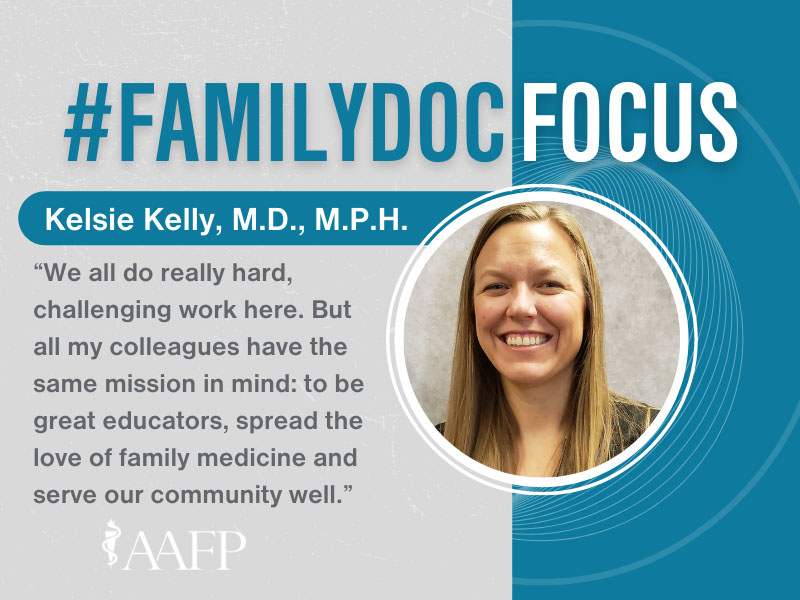Kansas Mentor Expanding Access for Patients in Need
December 7, 2021, 12:27 p.m. David Mitchell — Kelsie Kelly, M.D., M.P.H., developed a strong interest in women’s health as a student at the University of Kansas School of Medicine, and her interest in pediatrics spiked when she worked with a developmental pediatrician for a year while finishing her master’s degree in public health. So when a research colleague asked if anyone was interested in helping transition a group of patients with Turner syndrome from pediatrics to adult care, Kelly’s hand shot in the air.

“When kids who have any sort of condition outside the norm transition from pediatrics to the adult world, there’s opportunity for a gap in care,” said Kelly, an assistant professor of family medicine and community health at KU since 2013. “Family medicine is well suited to fill that gap because we see patients across the lifespan.”
Kelly assembled a team, including cardiology, endocrinology, audiology and psychology, that sees women with Turner syndrome in quarterly clinics.
“We try to meet all their needs and answer all their questions in one setting so they’re only taking off work one time or missing school once,” said Kelly, who notes that the few other adult Turner syndrome clinics that exist are typically housed in subspecialty clinics. “We coordinate care across different specialties all the time in family medicine, but to have a multidisciplinary clinic like that housed in our clinic is unique.”
So unique, in fact, that some patients travel from as far as St. Louis, Nebraska and western Kansas to see Kelly and her team in Kansas City, Kan.
“It has been pretty rewarding because the women are so thankful,” she said. “Sometimes they haven’t had anybody understand their needs at all. I appreciate their flexibility because I’ve had to do a lot of learning along the way. I think what’s also interesting for me, as an academic physician, there’s not a lot of things known about adult women with Turner syndrome, following their lifespan, so there’s just lots of opportunities for research and scholarship down the road that I’m yet to harness.”
Before the pandemic, the clinics also included lunch and functioned with a social, supportive structure. Kelly said COVID-19 forced some of the clinics to virtual platforms, but she was encouraged that KU was still able to offer the women care. Some pediatric Turner syndrome clinics have been shuttered by COVID-19.
“By using telemedicine, we adapted our clinic,” she said. “That’s just what we do in family medicine. We just figure out a way to continue to meet the needs of our patients.”
KU hopes to meet the primary care needs of more Kansans with a newly accredited family medicine rural training track in Pittsburg, roughly two hours away in the state’s southeastern corner. Family medicine residents in the rural track will spend their first year in Kansas City and then years two and three in Pittsburg.
The program, the recipient of a Health Resources and Services Administration grant, is accepting applications this year for the 2022 Match and initially will have two slots per class, said Kelly, who has been the family medicine program director at the University of Kansas Medical Center in Kansas City since 2017.
“If you put in a residency program somewhere, usually those residents will practice in a similar environment after graduation, if not within a close radius to where they trained,” she said. “I’m hoping that if there is sufficient learner volume and everything goes well, that we can expand the resident number shortly down the road.”
Bethany Enoch, M.D., who was a co-chief resident with Kelly during their residency training at KU, will serve as assistant program director in Pittsburg.
“We work together well, we know each other and share similar interests and education, so I think the timing is right,” Kelly said. “We have a champion for the rural program in Pittsburg with Dr. Enoch, so when the award came out, we jumped at the opportunity. All the pieces were lined up to be able to pursue this. We’re pretty excited about this endeavor.”
Kelly, who grew up a little more than a half an hour from KU’s main campus and its medical school, earned her undergraduate, medical and public health degrees through the university, as well as her residency training. Her message to the residents she recruits is simple.
“We all do really hard, challenging work here,” she said. “But all my colleagues have the same mission in mind: to be great educators, spread the love of family medicine and serve our community well. Why would I not want to be a part of that? It just feels like home. It feels right.”